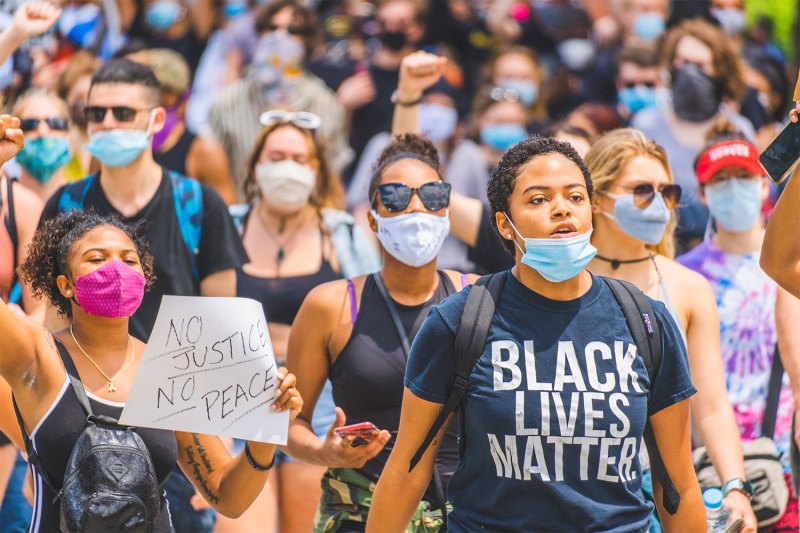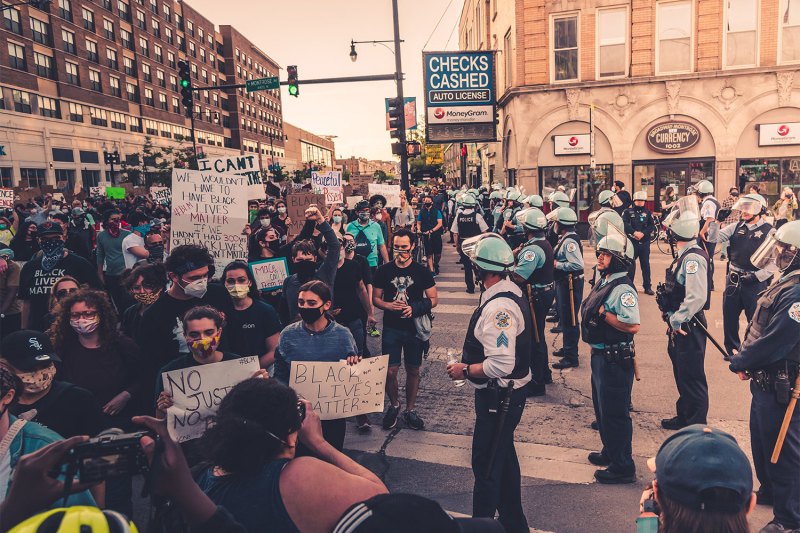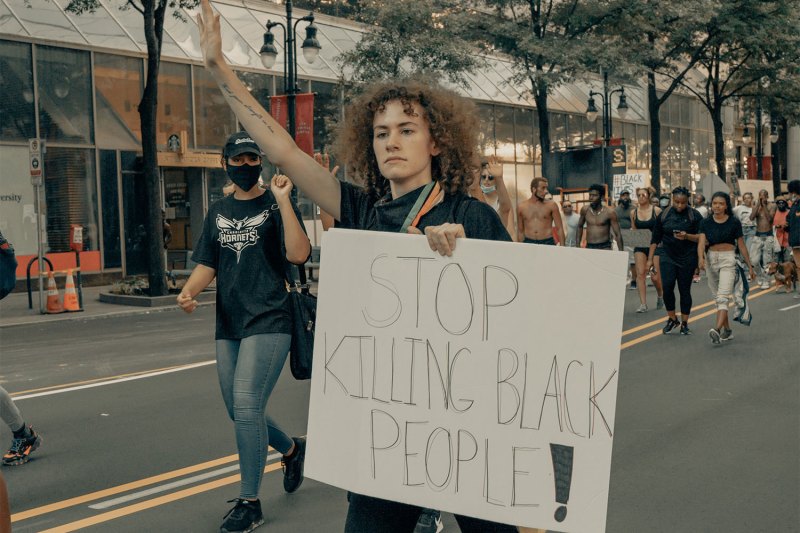If you’re a white ally looking to get involved in the fight against racial injustice by protesting, this guide is for you. In it, I (a queer white ally) have outlined some tips and tricks for how to protest in a way that’s meaningful, non-intrusive, and actually helpful to the cause. This list is by no means exhaustive, but does include things you’ll definitely want to keep in mind before, during, and after any Black Lives Matter demonstration you attend.
So, check out my ideas below, and please sound off if there’s any advice I may have missed. It’s on us as white allies to hold one another accountable and to figure out ways to use our privilege to dismantle systems of oppression in this country and beyond.
Know Your Place

Before you show up to your first protest, it’s important to know and recognize your place. You are going into someone else’s home, so it’s vital that you check your privilege at the door before barreling up the stairs. Protests can be electrifying spaces, but they’re not parties nor are they trendy gatherings to casually dip in and out of. They’re serious, highly organized, and mission-driven, so must be treated as such.
Educate Yourself
Part of knowing your place is knowing what you’re fighting for. So, it’s crucial to not only read up on the events that have sparked the current uprising, but to dig into the history of the racial justice movement that give these events their context. This fight has been going on for centuries and there’s a lot for us as allies to learn; thankfully, there are plenty of resources online that can help get you up to speed. And in case it needs saying, this education is your responsibility, no one else’s.
Don’t Antagonize Police
Yes, you’re angry — at the system, at police officers who literally keep getting away with murder. And because of this rage, I’m sure there’s nothing you’d like more than to stand in front of a cop and scream in his or her face. But please, don’t. While you might get to feel like a superhero for a hot second, your actions could put Black and Brown protesters in danger. How? Well, if the cops decide to react (which, let’s be honest, they will), they’re way more likely to go after BIPOC folks than you. The same white privilege that allows you to confront authority without fear could very well be the thing that saves you from the crowd-wide violence your actions might inspire.

Not All Chants Are For You
Though it may be tempting to join in every time a new chant is started, it’s important to recognize that not all protest chants are for all participants. Chants like “I Can’t Breathe!” and “Hands Up! Don’t Shoot!” speak specifically to a type of police brutality that most white folks simply haven’t experienced. If you’re called to join in, then do, but really think about the things that you’re saying. A similar note could be made about raising the Black Power fist; again, this is a gesture with a long and important history, so be careful about appropriating it.
Listen to Black Leaders
This one should be obvious, but it’s been striking to me how often Black leadership has been usurped by white allies at the protests I’ve been to. This is not okay, and it is vital that Black leaders be the ones calling the shots, leading the chants, and determining the flow of a march. If you really want to support the cause, listen more than you speak, and do as you’re told.
Support the Action
That being said, support the action however you are called to do so. If organizers need white bodies to form a barrier at the front line between police and BIPOC protesters, move appropriately. If organizers call white allies to go to the back so that Black and Brown demonstrators can hear speakers better, move appropriately. This may not be your space, but that doesn’t mean you can’t help make it a beautiful, inclusive, and empowering one.

Don’t Over Document
There’s a fine line to walk in terms of protest documentation. On one hand, it’s important to take photos, record videos, and generally document the experience of a historic protest movement like this. However, any documentation must serve the cause, not distract from it. Therefore, you should avoid posting anything on social media that centers YOU in the narrative. So, instead of snapping a cute protest selfie for your grid, use your phone to document arrests or instances of police violence. And please, please, please never include the faces of other protesters in your uploads.
Show Up
And finally, show up. It can feel weird, awkward, and uncomfortable, but I encourage you to sit with these feelings and show up to the protest anyway. As long as you’re respectful, empathetic, and aware of the privilege you’re bringing into the space, your presence will be a welcome one. So, make your signs, read up on the importance of defunding the police, and Give! Them! Hell!
For more reading, check out our guides to black-owned grooming and drink brands to support right now as well as a guide to how the fashion industry is responding to protests against police brutality.


